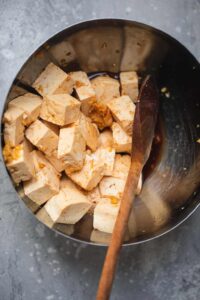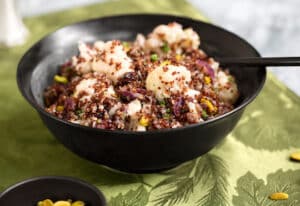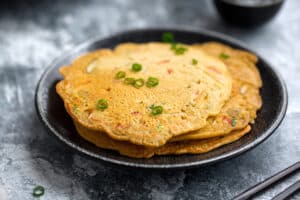While the detrimental effects of white sugar are still being debated, there's little doubt that Americans consume far too much of it. But most of us would be loath to giving up sweets altogether, no matter how bad the news. While most natural sweeteners aren't nutritional bell ringers, they are generally thought to produce less of a shock to the body's blood sugar level and metabolism than do simple sugars. Here's a brief guide to using and enjoying these kinder, gentler sweeteners.
Some natural sweeteners actually contain measurable nutrients—molasses, for example, is a good source of iron. And from a culinary standpoint, natural sweeteners offer bolder, more complex flavors than sugar, adding delectably different dimensions to baked goods and other treats.
AGAVE NECTAR: It may surprise you to learn, as it did me, that agave nectar comes from the same succulent plant from which tequila is made. The syrup-like nectar (which comes in darker or lighter varieties) is quite akin to honey, though not as cloyingly sweet or sticky. For vegans, it’s the perfect honey substitute, and for anyone, it’s a great liquid sweetener with a lower glycemic index than many other liquid or granular sweeteners. Honey, for example, has a glycemic index of 65 to 85, while agave nectar’s is between 11 and 30. This means it’s less likely to cause blood sugar levels to spike or to trigger the fat storage mechanisms in the body. Agave nectar doesn’t crystallize as does honey, and so has a long shelf life. It’s a little thinner than honey, and thus easier to pour and measure.
Agave nectar can also be used as a substitute for maple syrup, though it does have a milder, less distinct flavor and aroma. Use agave nectar as you would any liquid sweetener in baking (where you can substitute it in a one-to-one ratio with honey or maple syrup), in beverages, and to lend a touch of sweetness to dressings (like vinaigrette) and sauces (like teriyaki).
BARLEY MALT SYRUP: Dark, sticky and boldly flavored, barely malt sugar is nonetheless neither as assertive as blackstrap molasses nor as sweet as honey. Primarily maltose, a complex sugar that enters the bloodstream slowly. This sweetener offers trace amounts of B vitamins and several minerals. Barley malt syrup is a wonderful addition to squash and pumpkin breads, bran muffins, and hearty rye or pumpernickel breads. Use it to glaze sweet potatoes and to make winter "malteds" combined with bananas and nondairy milk.
BROWN RICE SYRUP: A traditional Asian sweetener, brown rice syrup is made from rice starch converted into maltose, a complex sugar. Rice syrup is the mildest-flavored of the liquid sweeteners and contains trace amounts of B vitamins and minerals. Use it interchangeably with honey or agave in cooking and baking, to sweeten hot or cold beverages and cereals, or as a spread for fresh breads. It’s great to use in unbaked sweets like granola bars and crispy rice bars due to its stickiness.
COCONUT SUGAR: Here’s one of the newer, healthier sweeteners on the market. It’s derived from the juices of tropical coconut palm sugar blossoms, and compared with most other sweeteners has a lower glycemic index and higher concentration of nutrients. It’s rich in minerals and B vitamins. Another nice thing about it as that most of it is sourced from small farms, whose revenue from the product remains in the local communities, and that the harvesting practices are among the most sustainable in the world. This product is just making its way into the marketplace and I will be adding more info and recipes in the near future.
DATE SUGAR: Not actually a sugar in the conventional sense, date sugar is ground from dehydrated dates. What a great source of sweetness—dates are high in fiber, and rich in a wide variety of vitamins and minerals. Date sugar can be exchanged measure for measure for sugar in baking, for cakes, muffins, and quick breads. Use it in place of brown sugar to make crumb toppings for pies and fruit crisps. It can't be used to sweeten beverages, though, as the tiny pieces won't dissolve.
FRUCTOSE: Derived from fruit sugar, this sweetener, closely resembles granular white sugar but is more concentrated so that less is needed for a similar effect—about ½ cup fructose to 1 cup of sugar. Though fructose has little nutritional value, it is generally believed that it doesn't disturb the blood sugar level as much as sucrose. Use it in place of sugar as an all-purpose sweetener—in baking and cooking, and in hot and cold beverages.
HONEY: Natural foods stores offer ways to explore this venerable sweetener beyond the common clover variety, from mild alfalfa honey, to more complex-flavored wildflower honeys, to strong, dark buckwheat honey. Since honey is primarily glucose, a simple sugar, there's little agreement about whether it's much better for the body than sugar strictly from that standpoint. However, it does contain trace amounts of some B vitamins and many minerals. The darker the honey, the more nutrients it contains. More importantly, honey, especially raw honey, has many antiviral and immune-boosting properties.
About ½ cup honey equals the sweetness of 1 cup of sugar. Use it as a general-purpose sweetener for hot beverages, in "smoothies," and for cooking and baking. In baking, reduce the amount of liquid called for, and lower the oven temperature by about 25 degrees.
Honey isn’t customarily used by vegans, since it’s considered an animal product. Still, many vegans aren’t bothered by using it if it’s locally sourced and comes from a beekeeper who doesn’t smoke out hive boxes. There are numerous articles online arguing for and against vegans using honey, search for “vegans and honey” and you’ll get both sides of the debate.
MAPLE SYRUP: While this well-loved sweetener is mainly sucrose, a simple sugar, it does contain several trace minerals, plus measurable amounts of calcium and iron. Avoid imitation maple syrups; look for ones labeled "pure" and graded Fancy or Grade A. Apart from its favored use as a topping for pancakes, maple syrup can be used successfully in baking and to add a delectable flavor to puddings.
MOLASSES: Long prized in southern American cookery, molasses is arguably the most nutritious of natural sweeteners. Derived from sugar cane, look for organic unsulphured molasses for optimal quality. Molasses is rich in iron and vitamin B6 and also provides calcium and potassium. Use molasses in making rye or pumpernickel breads, in sweet potato dishes, and to make robust barbecue sauces. Barbados molasses is a close relative of blackstrap; it is somewhat lighter in color and flavor.
SUCANAT®: The trade name for this product stands for SUgar CAne NATural, and is made from evaporated sugar cane juice. It is then milled into granules much the same size as white sugar, but with a tawny hue. Sucanat is about 88% sucrose, or simple sugar, as compared to table sugar, which is 99% sucrose, but it retains more vitamins, minerals, and other trace nutrients found in sugar cane. Sucanat has a mild but distinct flavor, with a hint of molasses. As an all-purpose sweetener for baking, cooking, and in hot or cold drinks, use it as a 1-to-1 replacement for white sugar.
STEVIA: Perhaps the most concentrated—as well as the most controversial—of natural sweeteners, Stevia is derived from an herb native to Paraguay. The FDA has approved it as a dietary supplement, but not as a sweetener. Available as a greenish powder (the crushed leaf, which is 30 times sweeter than sugar) or concentrated liquid (70 times sweeter than sugar), Stevia imparts a powerful sweetness with a somewhat anise undertone which is adored by some and barely tolerated by others. It can be used to sweeten hot and cold (unsweetened) cereals, hot beverages, and baked goods.
- For lots more features on healthy lifestyle, explore VegKitchen’s Healthy Vegan Kitchen page.
- Here are more of VegKitchen’s Natural Food Guides.






Ricki says
Great summary! And of course I'm one of the stevia "adorers". 😉 Over the past couple of years, I've also come to like yacon syrup--extremely low glycemic and almost-sort-kinda like molasses. I use it sparingly (because of the expense) but love it as an option since I can't eat so many of the other natural sweeteners on the list. 🙂
Louise says
You've done a great job of summarizing sugar alternatives.
But, please look-up the nutritional research on fructose. I have come across information that suggests fructose is related to fat production in the body and the inhibition of releasing body fat into energy due to insulin influence. If that's the case, you want to stay clear of fructose, as much as possible.
Many nutritionist theorize that since fructose does not occur in abundance in nature, then our bodies were not meant to process this type of sugar. Also, remember that table sugar (not naturally occurring) is 1/2 fructose, 1/2 sucrose. Most processed type sugars are the same...like molasses, maple syrup, agave syrup; they all have high occurrence of fructose.
There is a body of research looking at whole foods (not processed) like honey or dates that still contain fructose, but seem to be processed by our bodies in a more effective, efficient way. But I wouldn't conclude that it's ok to eat these in high amounts. Why take a chance?
So look up the fructose content of your sweeteners.